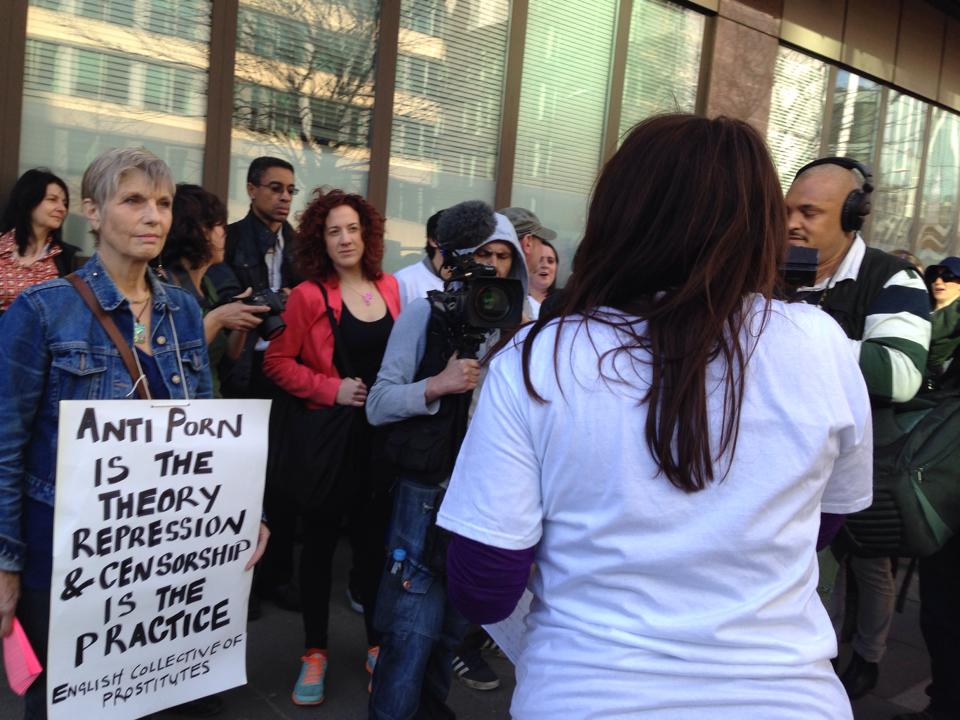Let those involved in porn speak for themselves
This weekend around 50 porn stars, strippers and sex workers turned up outside the Stop Porn Culture conference to make their voices heard

Your support helps us to tell the story
From reproductive rights to climate change to Big Tech, The Independent is on the ground when the story is developing. Whether it's investigating the financials of Elon Musk's pro-Trump PAC or producing our latest documentary, 'The A Word', which shines a light on the American women fighting for reproductive rights, we know how important it is to parse out the facts from the messaging.
At such a critical moment in US history, we need reporters on the ground. Your donation allows us to keep sending journalists to speak to both sides of the story.
The Independent is trusted by Americans across the entire political spectrum. And unlike many other quality news outlets, we choose not to lock Americans out of our reporting and analysis with paywalls. We believe quality journalism should be available to everyone, paid for by those who can afford it.
Your support makes all the difference.The arrival of the World Wide Web in the nineties brought with it an era of unprecedented communication that has fundamentally and irrevocably changed the nature of human discourse and knowledge. One of many results of this revolution was to introduce an age of sexual openness; and of course, easy access to pornography has formed a key part of that.
The British people, living in one of the democratic world’s most censored nations, welcomed internet porn with enthusiasm. Thanks to our bizarre system of video censorship, introduced (without apparent irony) in 1984, Brits were denied the access to porn on video and DVD that was freely available elsewhere in Europe and the United States.
When the formidable anti-filth campaigner Mary Whitehouse died in 2001, she arguably left behind a country that was far more relaxed in its sexuality than at any previous time in history. It seemed that her crusade for ‘traditional’ (i.e. repressive) moral values had failed. But the morality movement regrouped and reinvented itself for the new millennium. It abandoned the outdated language of Christian puritanical outrage and instead presented itself as a form of feminism, protecting the rights of women who - they claimed - were victims of the sex industries.
First they came for the strippers. Strip clubs found themselves picketed by new morality groups such as Object, which claimed they were there to save the dancers. But some dancers did not agree that they were victims, or that they needed saving. They began to organise against the anti-strip club campaigners, with a number of them joining the Equity performers' trade union. One stripper involved with the campaign told me:
‘I’ve never felt like an object in a derogatory sense. My audiences certainly never made me feel like that.’
The American organisation Stop Porn Culture (SPC) teamed up with Object to launch SPC’s UK arm in London this past weekend. When she heard of the conference, the ex-porn star and pro-sex feminist campaigner Renee Richards contacted my campaigning organisation, Sex & Censorship, and suggested we organise a protest of the event. I gladly agreed and we announced the event - titled Don’t Censor Me! - on social media.
On Saturday, around 50 porn stars, strippers and sex workers turned up outside the SPC conference to make their voices heard. Speakers at the protest including porn stars Renee Richards and Benedict Garrett, stripper Edie Lamort, obscenity lawyer Myles Jackman, and representatives from sex worker organisations including the English Collective of Prostitutes and Queer Strike. The speakers were unanimous: the lives of women who sell sex will not be improved by censoring pornography.
The day was seen by protesters as part of a growing movement to defend sexual freedom in Britain against a new wave of morality campaigners. For the first time in four decades, a new sexual revolution may be underway.
Jerry Barnett is a campaigner for free expression, and the founder of Sex & Censorship, which can be found on the web, Facebook and on Twitter
Join our commenting forum
Join thought-provoking conversations, follow other Independent readers and see their replies
Comments